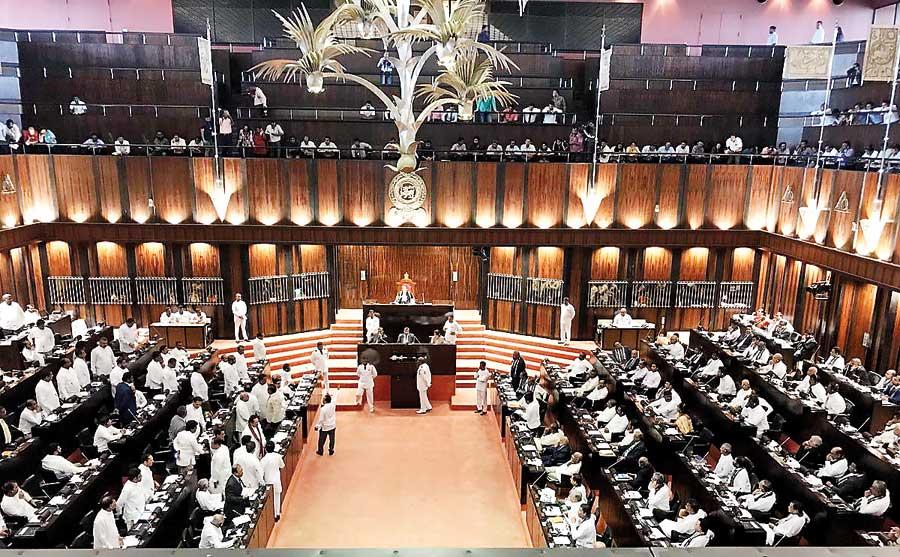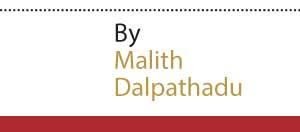Reply To:
Name - Reply Comment

Clashes in the constitution often have a history in destabilizing Sri Lanka’s progress. Can the resignation of the executive result in a constitutional crisis because of the 20th Amendment? An argument that has grasped the attention of the general public but being neglected by the opposition. Multiple protests have erupted throughout the country as the most popular protest is in front of the Presidential Secretariat demanding the President’s resignation. Experts in the government believe this movement has developed due to high living cost and lack of access to basic necessities. While this movement is justified by the economic crisis the country is facing, it is also impractical to ignore the question what can happen if the President resigns? Can the 20th amendment create a constitutional crisis in the midst of the current economic dilemma?
An argument that has grasped the attention of the general public but being neglected by the opposition. Multiple protests have erupted throughout the country as the most popular protest is in front of the Presidential Secretariat demanding the President’s resignation. Experts in the government believe this movement has developed due to high living cost and lack of access to basic necessities. While this movement is justified by the economic crisis the country is facing, it is also impractical to ignore the question what can happen if the President resigns? Can the 20th amendment create a constitutional crisis in the midst of the current economic dilemma?
"More uncertainty arises and the potential of another contradiction of laws in the 20th Amendment is displayed in Article 33 (h) when the executive can do all things, not being inconsistent with the provisions of the constitution or written law, as by international law, custom or usage he is required or authorized to do"
How can the 20th amendment create a constitutional crisis?
According to chapter 7 Article 31, second paragraph of the 20th Amendment of the constitution. No person who has been twice elected to the office of President by the people shall be qualified thereafter to be elected to such office by the people. But in the same chapter Article 40, paragraph 1(C) adds that during the period between the occurrence of the vacancy of the Presidency and the assumption of office by the new President, the Prime Minister shall act in the office of President. The contradiction between these two paragraphs doesn’t allow a former President who has been elected twice and currently serves as Prime Minister to hold the presidency again. In such a situation what could possibly happen? Prime Minister Mahinda Rajapaksa can present his case that he is not elected by the people to the Presidency but by the parliament under Article 40 of the 20th Amendment. Article 31 that prevents Prime Minister Mahinda Rajapaksa to hold the presidency clearly states that a person who has been twice elected by “the people” cannot hold office but doesn’t mention anything about being appointed through the parliament or the legislative body. But there are two sides to the coin, in paragraph 1 (A) of Article 40 explains that if the office of the President shall become vacant prior to the expiration of his term of office, Parliament shall elect as President one of its members who is qualified to become elected.
The opposition claims that Prime Minister Rajapaksa doesn’t hold the majority at the moment and the opposition doesn’t hold the majority either. If another MP decides to make the majority in this situation and the current Prime Minister also hopes to fill the vacancy by attempting to show a majority and no party is able to reach 113 votes, the constitution doesn’t explain what precautions or options are available to precede in such a situation. If such a situation happens in a country that is already declared politically unstable by many international counterparts, it can give unimaginable leverage to neighbouring countries that has interest in Sri Lanka for economic and military purposes.
Another red light in the 20th Amendment for the President’s resignation is paragraph 3A (a) (i) of Article 31 where it indicates that the President may at any time after the expiration of four years from the commencement of his first term of office by proclamation, declare his intention of appealing to the people for a mandate. This paragraph eliminates the President’s possibility to hold an election until four years are completed in his presidency which puts us back into a dead end illustrated by the contradiction of Articles 31 and 40 of the 20th Amendment if the President resigns since he can’t host an election.
"It is also impractical to ignore the question what can happen if the President resigns? Can the 20th amendment create a constitutional crisis in the midst of the current economic dilemma?"
Are there any legal possibilities?
There are few options applicable by the 20th Amendment of the constitution. The 38th Article provides legislation regarding the vacation of office by the President. First paragraph (b) have stated that the President can resign his office by a writing under his hand addressed to the Speaker but after his resignation, it is unclear what solution or option can be implemented following the contradiction between articles 31 and 40. But Article 38 mentions the possibility of the President’s resignation addressed to the Speaker of the parliament.
Another option to vacate the office of the presidency is in the following paragraph of article 38 (2)(a) where any member of the parliament may, by writing addressed to the Speaker give notice of a resolution alleging that the President is permanently incapable of discharging the functions of his office by reason of mental or physical infirmity or the President has been guilty of intentional violation of the constitution, treason, bribery, corruption involving the abuse of his powers and any offence under any law, involving moral turpitude and setting out full particulars of allegation made and seeking an inquiry report by the Supreme Court.
But the constitution continues that no notice of resolution shall be entertained by the Speaker or placed on the Order Paper of the parliament unless it is signed by two third of the parliament or such notice of resolution is signed by not less than one-half of the whole number of MPs and the Speaker is satisfied that such allegations merit inquiry and report by the Supreme Court. So basically with two third of voting in favor, the Speaker has to refer the allegations against the President contained in the resolution to the Supreme Court for inquiry purposes and obtain a report. The President however under paragraphs (2) (d) have the right to appear and be heard in person or by an attorney of law and challenge the allegations against him prior to the handing of the report of its determination by the Supreme Court to parliament.
In such occasion where the Supreme Court determines the President is incapable of discharging the functions of his office, the parliament may by a resolution pass by not less than two thirds of the MPs voting in favor of removing the President from office. The suspicion on how practical this process can be is a mystery among lawmakers and blindsided by the protestors.
More uncertainty arises and the potential of another contradiction of laws in the 20th Amendment is displayed in Article 33 (h) when the executive can do all things, not being inconsistent with the provisions of the constitution or written law, as by international law, custom or usage he is required or authorized to do. If a resolution under paragraph (2) (a) of the 38th Article to be implemented against the President, will article 33 be a safe haven for the President to remain in power? Does Article 33 give the President power not to abide to the process of a notice of resolution against him? Or do Articles 38 and 33 create a potential constitutional crisis? The 20th Amendment questions us as to what protestors can really demand for. Will a constitutional crisis destroy the narrow fragment of political stability left in Sri Lanka?